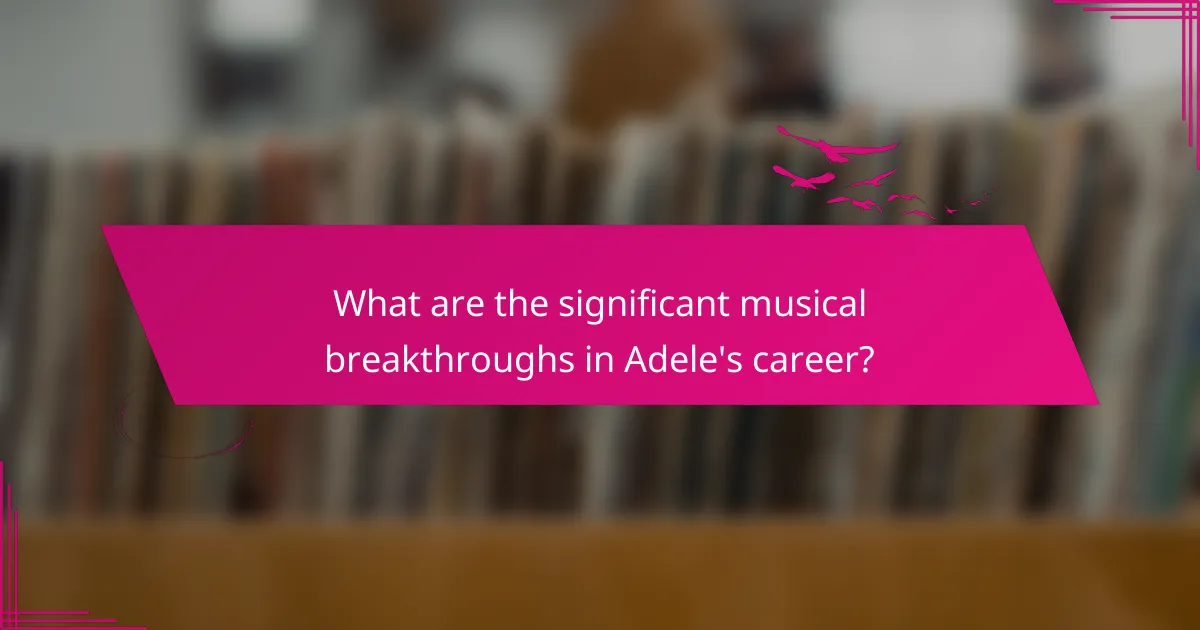Adele is a renowned British singer-songwriter known for her powerful voice and emotive songwriting. Her career began with the release of her debut album “19” in 2008, which showcased her unique blend of soul, pop, and R&B, earning her critical acclaim and two Grammy Awards. Her subsequent albums, “21” and “25,” further established her as a global superstar, featuring iconic hits and winning numerous awards, including 16 Grammy Awards in total. Adele’s music is heavily influenced by her personal experiences and artists like Etta James and Ella Fitzgerald, contributing to her distinctive style. The article explores Adele’s early years, musical influences, and significant breakthroughs that have solidified her position as one of the best-selling music artists in history.

What defines the life and career of Adele?
Adele’s life and career are defined by her powerful voice and emotional songwriting. She gained fame with her debut album “19,” released in 2008. This album showcased her unique blend of soul, pop, and R&B. Adele’s second album, “21,” solidified her status as a global superstar. It included hits like “Rolling in the Deep” and “Someone Like You.” She has won numerous awards, including 16 Grammy Awards. Adele’s music often draws from personal experiences, particularly her relationships. Her ability to connect with audiences through her lyrics is a key aspect of her career. Adele’s influence extends beyond music, impacting popular culture and inspiring many artists.
How did Adele’s early years shape her musical journey?
Adele’s early years significantly shaped her musical journey by providing her with a rich cultural backdrop. She grew up in Tottenham, London, where she was exposed to various musical influences. Her mother played a crucial role by introducing her to artists like Etta James and Ella Fitzgerald. Adele began singing at a young age, participating in school performances and local talent shows. This early exposure fostered her passion for music and honed her vocal skills.
Additionally, her experiences with personal challenges, such as her parents’ divorce, influenced her songwriting. These formative experiences provided her with emotional depth and authenticity in her music. Adele’s early years laid the foundation for her distinct sound and lyrical storytelling. This background ultimately contributed to her success as a globally recognized artist.
What were the key influences in Adele’s childhood?
Adele’s childhood was influenced by her mother’s love for music and her exposure to various genres. Her mother, Penny Adkins, played a significant role in shaping her musical tastes. Adele was particularly inspired by artists like Etta James and Ella Fitzgerald. Growing up in Tottenham, London, she faced challenges that fueled her songwriting. Her experiences of heartbreak and family dynamics also contributed to her emotional depth in music. These influences laid the foundation for her future success as a singer and songwriter.
How did her upbringing impact her songwriting style?
Adele’s upbringing significantly influenced her songwriting style. Growing up in Tottenham, London, she was exposed to a diverse musical environment. Her single mother played a crucial role in her early life. This environment fostered a strong emotional connection in her lyrics. Adele’s experiences with heartbreak and family dynamics shaped her themes. She often draws from personal stories, making her music relatable. The influence of artists like Etta James and Ella Fitzgerald also marked her style. These factors combined create a unique blend of soul and pop in her work.
What were the pivotal moments in Adele’s early career?
Adele’s early career featured several pivotal moments. In 2006, she graduated from the BRIT School for Performing Arts. That same year, she uploaded her demo on MySpace, gaining attention. In 2007, she signed with XL Recordings. Her debut album, “19,” released in 2008, showcased her talent. The album included the hit single “Chasing Pavements,” which earned her critical acclaim. Adele won the Grammy Award for Best New Artist in 2009. This recognition solidified her place in the music industry. These milestones set the foundation for her future success.
How did Adele’s first album change the music landscape?
Adele’s first album, “19,” significantly changed the music landscape by reviving interest in soulful vocal performances. Released in 2008, it showcased her powerful voice and emotional songwriting. The album blended elements of pop, soul, and R&B, appealing to a wide audience. “19” produced hit singles like “Chasing Pavements” and “Hometown Glory,” which received critical acclaim. The album’s success led to a resurgence of singer-songwriters in mainstream music. It sold over 3 million copies in the United States and won two Grammy Awards. Adele’s authenticity and relatability set a new standard for artists, influencing the direction of pop music in the 2010s.
What role did her breakthrough single play in her rise to fame?
Adele’s breakthrough single, “Rolling in the Deep,” was pivotal in her rise to fame. Released in 2010, it showcased her powerful vocals and emotional depth. The song topped charts worldwide, reaching number one in multiple countries. It sold over 10 million copies in the U.S. alone. This commercial success established her as a leading artist in the music industry. The single also earned her numerous awards, including Grammy Awards for Record of the Year and Song of the Year. Its critical acclaim further solidified her reputation as a talented singer-songwriter. “Rolling in the Deep” marked the beginning of Adele’s global recognition and paved the way for her subsequent albums and tours.

What influences have impacted Adele’s music?
Adele’s music has been influenced by various artists and life experiences. She cites Etta James and Ella Fitzgerald as major inspirations. Their emotional vocal styles shaped her own singing approach. Additionally, Adele’s personal experiences, such as heartbreak and relationships, deeply inform her lyrics. Her upbringing in Tottenham, London, also plays a role in her musical identity. The blend of soul, pop, and R&B genres reflects her diverse influences. Collaborations with producers like Rick Rubin further expanded her sound. These elements combine to create the distinctive style that defines Adele’s music.
How have personal experiences shaped Adele’s lyrics?
Adele’s lyrics are deeply influenced by her personal experiences. Her songs often reflect themes of heartbreak, love, and loss. For instance, her album “21” was inspired by her breakup with ex-boyfriend, which she described as a painful yet transformative period. The emotional depth in her writing resonates with listeners due to its authenticity. Adele has stated that she draws from her life events to create relatable music. This connection to her experiences allows her to convey genuine emotions in her lyrics. Critics and fans alike have noted the autobiographical nature of her work, which adds to its impact.
What themes are prevalent in Adele’s songs?
Adele’s songs predominantly explore themes of heartbreak, love, and personal growth. Heartbreak is often depicted through emotional narratives about lost relationships. Love is portrayed in various forms, including romantic and familial connections. Personal growth is illustrated through reflections on self-discovery and resilience. These themes resonate deeply with listeners, contributing to Adele’s widespread appeal. Her lyrics often draw from her own life experiences, enhancing their authenticity. For example, her album “21” centers around her tumultuous breakup, showcasing vulnerability and strength. This thematic consistency has made her music relatable and impactful across diverse audiences.
Which artists have inspired Adele’s musical style?
Adele’s musical style has been inspired by several artists. Key influences include Etta James, whose emotive vocal style resonates with Adele’s approach. Another significant influence is Ella Fitzgerald, known for her jazz standards and vocal precision. Additionally, Roberta Flack’s soulful ballads have impacted Adele’s songwriting. The influence of Mary J. Blige is evident in Adele’s blend of pop and R&B. Furthermore, the songwriting of Carole King has shaped Adele’s lyrical depth. These artists have collectively contributed to the unique sound and emotional resonance found in Adele’s music.
In what ways has Adele contributed to the music industry?
Adele has significantly contributed to the music industry through her powerful vocals and emotional songwriting. Her debut album, “19,” introduced a fresh sound, blending soul and pop. This album earned her two Grammy Awards in 2009. Adele’s second album, “21,” became a global phenomenon, selling over 31 million copies worldwide. It featured hits like “Rolling in the Deep” and “Someone Like You.”
Her work has influenced a generation of artists, inspiring them to embrace authenticity in their music. Adele has also broken numerous records, including the fastest-selling album in the UK. Her third album, “25,” won the Grammy Award for Album of the Year in 2017. Adele’s impact extends beyond music; she has used her platform to advocate for mental health and body positivity.
What awards and recognitions has Adele received?
Adele has received numerous awards and recognitions throughout her career. She has won 16 Grammy Awards, including Album of the Year and Record of the Year. Adele has also earned 9 Brit Awards, highlighting her impact on the British music scene. Additionally, she has received an Academy Award for Best Original Song for “Skyfall.” Adele’s accolades include a Golden Globe Award and multiple American Music Awards. Her achievements reflect her influence and success in the music industry.
How has Adele’s music influenced contemporary artists?
Adele’s music has significantly influenced contemporary artists by reshaping emotional expression in pop and soul genres. Her powerful vocal delivery and heartfelt lyrics have set a new standard for authenticity in music. Artists like Sam Smith and Ed Sheeran cite her as a major inspiration. Adele’s blending of various musical styles has encouraged artists to explore genre fusion. Her success has also highlighted the importance of storytelling in songwriting. The commercial success of her albums has paved the way for other artists to prioritize emotional depth. Adele’s impact is evident in the rise of artists who emphasize vocal prowess and personal narratives.

What are the significant musical breakthroughs in Adele’s career?
Adele’s significant musical breakthroughs include her debut album “19,” released in 2008. This album showcased her powerful vocals and songwriting skills. It earned her two Grammy Awards, establishing her as a prominent artist.
Her second album, “21,” released in 2011, further solidified her success. It featured hits like “Rolling in the Deep” and “Someone Like You.” The album won six Grammy Awards and became one of the best-selling albums of all time.
In 2015, Adele released “25,” which included the global hit “Hello.” This album broke several sales records and won five Grammy Awards. Adele’s ability to connect emotionally through her music has been a hallmark of her career.
Her live performances, including a record-breaking concert at Wembley Stadium in 2017, have also contributed to her acclaim. Adele’s musical breakthroughs have made her one of the best-selling music artists in history.
How did Adele’s albums evolve over time?
Adele’s albums evolved significantly over time, showcasing her growth as an artist. Her debut album, “19,” released in 2008, featured a blend of soul and pop influences. It established her as a powerful vocalist and songwriter. The album included hits like “Chasing Pavements” and “Hometown Glory,” which highlighted her emotional depth.
In 2011, Adele released “21,” which marked a shift towards more mature themes. This album incorporated elements of blues and gospel. It featured chart-topping singles such as “Rolling in the Deep” and “Someone Like You.” “21” resonated widely, earning multiple Grammy Awards and solidifying her global success.
Adele’s third album, “25,” was released in 2015. It continued her exploration of heartbreak and nostalgia. The lead single, “Hello,” broke records upon release, becoming a cultural phenomenon. “25” further showcased her vocal range and emotional storytelling.
In 2021, Adele released “30,” her most personal album to date. It delved into her experiences of divorce and self-discovery. The album included the single “Easy on Me,” which received critical acclaim. Each album reflects her evolving artistry and personal journey, marking distinct phases in her life and career.
What innovations did Adele introduce in her later works?
Adele introduced several innovations in her later works, particularly with her album “30.” She incorporated a more introspective and personal songwriting approach. This album explores themes of divorce, motherhood, and emotional healing.
Adele also experimented with different musical styles, blending pop, soul, and R&B elements. She collaborated with various producers, including Greg Kurstin and Ludwig Göransson, to achieve a fresh sound.
Moreover, the production featured orchestral arrangements, enhancing the emotional depth of her music. Adele’s vocal delivery became more nuanced, showcasing her growth as an artist.
These innovations reflect her evolution and maturity in both songwriting and performance.
How did collaborations impact the direction of her music?
Collaborations significantly influenced the direction of Adele’s music. Working with various artists and producers expanded her musical style. Collaborations introduced her to different genres, enhancing her versatility. For instance, her partnership with producer Rick Rubin on “25” shifted her sound towards a more stripped-down, emotional approach. Collaborating with artists like Bruno Mars and Sia also infused pop elements into her work. These interactions allowed her to experiment with new songwriting techniques. The diversity in her collaborations contributed to her commercial success and critical acclaim. Overall, collaborations played a crucial role in her artistic evolution.
What lessons can be learned from Adele’s career?
Adele’s career teaches the importance of authenticity and emotional connection in music. She gained widespread acclaim for her genuine songwriting and powerful vocals. Her debut album, “19,” showcased her raw talent and personal experiences. Adele’s ability to convey deep emotions resonated with audiences, leading to commercial success. Consistency in her artistic vision is another lesson; she maintained her unique style across albums. Additionally, her resilience in overcoming personal challenges demonstrates the value of perseverance. Adele’s commitment to her craft has earned her numerous awards, including 15 Grammy Awards. These elements combine to illustrate how authenticity, consistency, and resilience can lead to a successful career in the music industry.
What strategies contributed to Adele’s sustained success?
Adele’s sustained success is attributed to her authentic songwriting and powerful vocal delivery. She connects deeply with her audience through relatable themes of love and heartbreak. Her ability to convey emotion resonates universally, leading to widespread appeal. Strategic collaborations with renowned producers and songwriters have enhanced her musical quality. Adele’s effective use of social media helped build a loyal fanbase. She also maintained a consistent image of authenticity and humility, endearing her to fans. Additionally, her live performances showcase her vocal prowess, further solidifying her reputation. Adele’s careful album releases, often spaced apart, create anticipation and maintain her relevance in the music industry.
How can aspiring artists emulate Adele’s journey?
Aspiring artists can emulate Adele’s journey by focusing on authenticity and emotional storytelling in their music. Adele gained recognition by writing songs that reflect her personal experiences. She started by sharing her work on platforms like MySpace, which helped her build an audience.
Networking with industry professionals is crucial. Adele’s breakthrough came after being discovered by a record label executive. Developing a unique sound and style is also important. Adele’s blend of soul, pop, and R&B set her apart in the music industry.
Consistent practice and honing vocal skills are essential. Adele trained her voice and worked on her songwriting. Artists should also be open to feedback and willing to evolve. Adele’s willingness to grow as an artist contributed to her success.
Lastly, perseverance in the face of challenges is vital. Adele faced setbacks but continued to pursue her passion. Following these steps can help aspiring artists carve their own path, similar to Adele’s.
The main entity of this article is Adele, a globally recognized singer-songwriter known for her powerful voice and emotional songwriting. The article provides an overview of Adele’s life and career, detailing her early years in Tottenham, London, and the significant influences that shaped her musical journey, including her mother’s role and exposure to various artists. Key milestones in her career, such as the release of her debut album “19” and subsequent albums “21,” “25,” and “30,” are highlighted, along with the themes prevalent in her lyrics, her collaborations, and the impact she has made on the music industry. The article also discusses the lessons aspiring artists can learn from Adele’s journey and the strategies that have contributed to her sustained success.